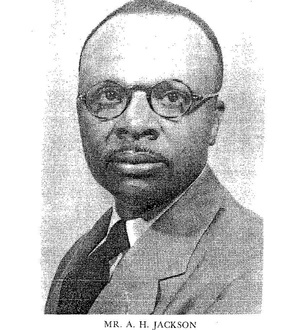Anthoine Hugo Jackson, Sr

Mr. A.H. Jackson, Sr., was born July 1893 in Mooringsport, Louisiana and died in October 1978 in Baton Rouge. He was a graduate of Southern University and Fisk University, 1916 and 1924, respectively. Additionally, he received his Masters from Atlanta University in 1934.
Mr. Jackson taught in the Louisiana School System for 45 years in Franklin, St. Joseph and Shreveport; principal of Tensas Parish Training School in St. Joseph; Morehouse Parish Training School in Bastrop from 1931 to 1944; retired in 1957 as principal of McKinley High School, Baton Rouge, Louisiana.
_______________________________
Note: Mr. Jackson, the principal of the Tensas Agricultural and Industrial Training School in St. Joseph, Louisiana, made these comments to White plantation owners about the health crises in Tensas Parish after the 1927 flood.
The “value of a dead person is zero,” he warned, “but the value of a sick person is minus zero.” Caring for the sick, he implied, drew workers away from more productive activities on the plantation. It was best, he suggested, to offer preventative healthcare rather than pay an ever-increasing price for lingering illness.
Source: “Tensas Parish Health Unit Notes,” Tensas Gazette, 10 August 1928, and “Malaria Education,” Tensas Gazette, 9 November 1928.
Mr. Jackson taught in the Louisiana School System for 45 years in Franklin, St. Joseph and Shreveport; principal of Tensas Parish Training School in St. Joseph; Morehouse Parish Training School in Bastrop from 1931 to 1944; retired in 1957 as principal of McKinley High School, Baton Rouge, Louisiana.
_______________________________
Note: Mr. Jackson, the principal of the Tensas Agricultural and Industrial Training School in St. Joseph, Louisiana, made these comments to White plantation owners about the health crises in Tensas Parish after the 1927 flood.
The “value of a dead person is zero,” he warned, “but the value of a sick person is minus zero.” Caring for the sick, he implied, drew workers away from more productive activities on the plantation. It was best, he suggested, to offer preventative healthcare rather than pay an ever-increasing price for lingering illness.
Source: “Tensas Parish Health Unit Notes,” Tensas Gazette, 10 August 1928, and “Malaria Education,” Tensas Gazette, 9 November 1928.